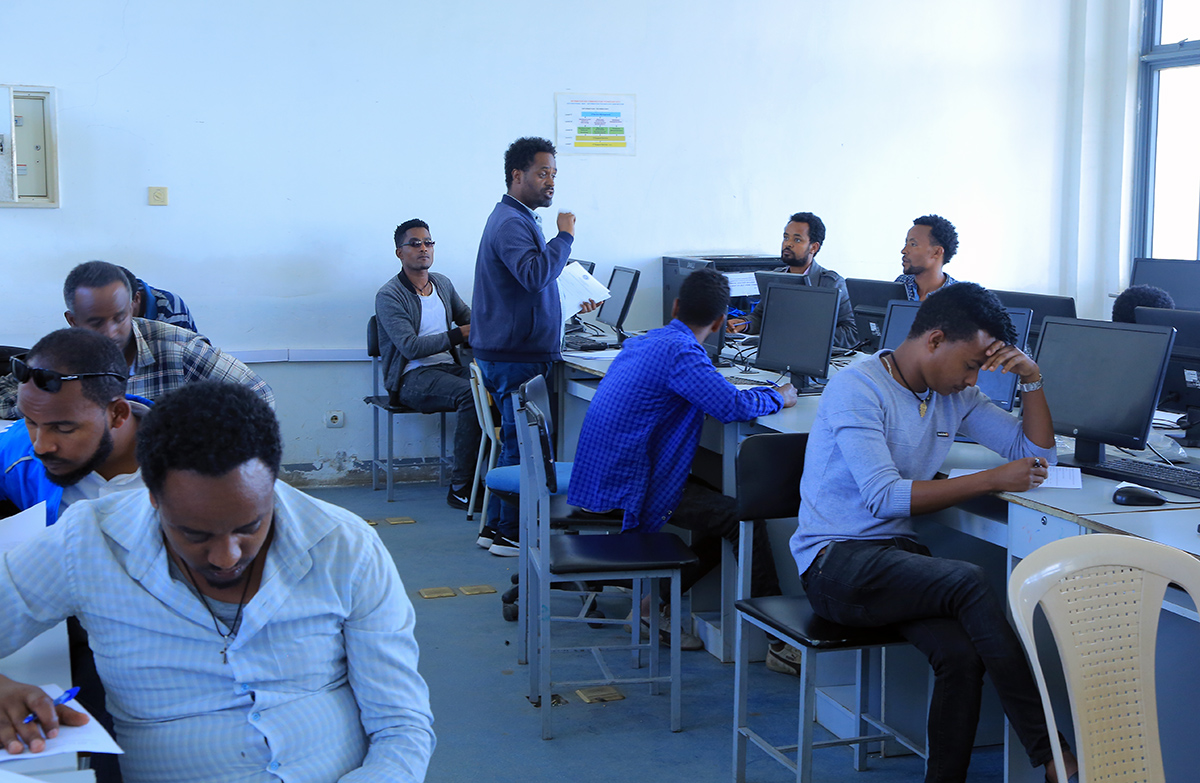Modernizing the vocational teacher education in Ethiopia

Pedagogical and technological development of e-learning is one of the strategic development areas in vocational teacher education and training in Ethiopia. According to the Ethiopian Education Development Roadmap (EEDR 2018) equity seems to be well addressed in TVET gender participation. The female participation, on average, is about 51 %, but female students are enrolled in vocational programs traditionally considered for women. Equity in access between rural and urban population and among different ethnic groups has been improved. In term of access to quality & relevant TVET, there is however disparity. Most TVET institutions in rural areas and emerging regions are poorly equipped with relevant facilities as compared to TVET institutions in central regions. Thus, the access for education is not equitable and doesn’t offer the students equal job opportunities.
In Capacity Building for Modernizing TVET Pedagogy in Ethiopia (the MOPEDE project) 2020-2024 our objective is to improve and modernize the accessibility and quality of VET teacher around Ethiopia. This means that the e-learning will be institutionalized in Federal Technical and Vocational Education and Training Institute (FTI) and its 15 satellite colleges and integrated into their curricula with updated teaching and learning methods. This requires both competence creation in pedagogy, technical facilities and support for teachers and students as well the management and commitment of the whole institution for the change and new ways of education and learning.
 The sustainable and accessible for all e-learning possibilities require institutional support and supportive services for teachers and students in technical and pedagogical ways. The Covid19 have shown that to cope disastrous situations, we must always be ready for distance teaching using e-learning means. This can be achieved by making e-learning a culture in day-to-day activities and emphasizing a blended approach.
The sustainable and accessible for all e-learning possibilities require institutional support and supportive services for teachers and students in technical and pedagogical ways. The Covid19 have shown that to cope disastrous situations, we must always be ready for distance teaching using e-learning means. This can be achieved by making e-learning a culture in day-to-day activities and emphasizing a blended approach.
Challenges are to overcome
Recent year has shown how the pandemic dramatically affected the availability and accessibility to study. FTI and satellite campuses were closed for over 10 months. In the emergency 48 FTI teachers took the advantage to use the Moodle platform with the support mainly from colleagues and the Internet. Over 1600 students logged in to the institutional Moodle eLearning platform. Over 420 Master students managed to complete the final exam online. These were suddenly taken big steps towards digital learning.
The internet penetration in Ethiopia (January 2020) was 19 % while the mobile network accessed 41 % of the total population with the growth of 18% from last year. Over 56 % of the web traffic is by mobile phones in 2019, while the laptop use of web is increasing rapidly (Digital 2020: Ethiopia 2020). Stable connections and reasonable devices for students and teachers are the bases for accessibility and sustainability for e-learning.
Institutional support is needed
Based on the questionnaire done among FTI and satellite staff in 2020, support is needed to access and use technology and e-learning tools, and for designing learning content and teaching methods. So far most of the support to for e-learning is acquired on the internet, from FTI ICT department, and from other colleagues. For continuous development, support should be systematic, easy to access and provided by institution.
Facilities and tools for teachers
To be able to create diverse learning material to serve inclusive learners, teachers need appropriate facilities and applications with supportive services. For that purpose, E-Lab will be developed during the MOPEDE project. E-Lab is planned to give various audiovisual options for that purpose. Based on the questionnaire of personnel most in-demand are fast network, online video teaching service such as Zoom or Google Meet, tools for multimedia, simulation learning and possibilities for augmented reality.
Pedagogy and inclusion hand in hand
Pedagogical improvement by e-learning models and principles must be sealed in blended learning, combining face to face learning and e-learning. At the same time, we should consider how e-learning can support inclusion and as well it might exclude some of the learners. Development of accessibility and participation for education is especially important for women and physically disable learners. For them, the engagement to use technology and participation for e-learning is needed to be considered when integrating e-learning into curricula.
Motivation and needs for e-learning development are high
Based on the questionnaire the main barriers towards e-learning are lack of skills and knowledge on how to use the technology, connection problems, lack of equipment and lack of knowledge to conduct practical sessions in participatory way. Personnel were eager toward e-learning and implied positive attitude towards e-learning development. The motivation to develop distance education and accessibility to study is necessary in all circumstances.
During the MOPEDE project, the online workshops for key experts and FTI personnel have worked extremely well despite the challenges in 2020. After the planning phase, we started the project activities in January 2021 with MOPEDE Opening seminar and teacher training with active learning methods in digital era.
Authors
Authors are key experts of MOPEDE project:
Pauliina Silvennoinen, JAMK
Anne Harmoinen, Centria
Matiyas Teshome, FTI
Anna-Liisa Ojala, JAMK
References
Digital 2020: Ethiopia. 2020. Datareportal. Global Digital Insights. Referred to 8.12.2020. https://datareportal.com/reports/digital-2020-ethiopia
Capacity Building for Modernizing TVET Pedagogy in Ethiopia is a HEI-ICI funded project which improves the accessibility and quality of vocational teacher education in Ethiopia. The project is coordinated by JAMK University of Applied Sciences. The Higher Education Institutions Institutional Cooperation Instrument (HEI ICI) supports cooperation projects between higher education institutions in Finland and the developing world. The projects support the HEIs as they develop their subject-specific, methodological, educational and administrative capacity. The programme is funded by the Ministry for Foreign Affairs of Finland and administered by the Finnish National Agency for Education.

This blog post was originally published on Opekorkeassa tapahtuu blog in February 2021.